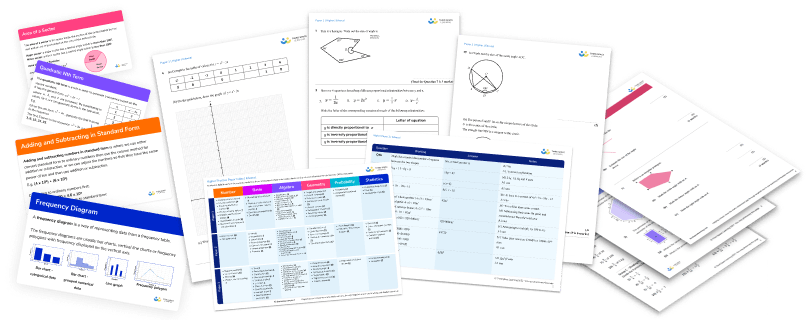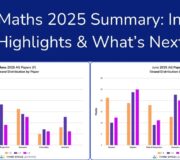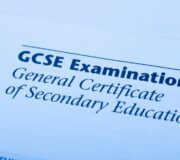GCSE Results 2025: Headlines, Analysis & Next Steps For Teachers & School Leaders
This article was originally published on Friday 22nd August 2025
Now that the GCSE results 2025 have been released, we’re here with a summary of the key points you need to know and what to do next. As usual, we’ve worked with experienced examiner, secondary maths teacher and regular contributor Christine Norledge on this update for you.
Christine helped us create the Paper 2 and Paper 3 revision lists in 2025 from her analysis of the 2025 GCSE maths paper 1 and 2025 GCSE maths paper 2. If you’re looking for deeper analysis on the types of questions asked and topics covered in the 2025 GCSE maths papers, take a look at this set of blogs, and look out for the final mega analysis round up coming soon.
IF YOU’RE PREPARING FOR SEPTEMBER
With GCSE results day 2025, Thursday 21 August over, if you’re already thinking about how to prepare your 2026 GCSE cohorts in maths get in touch. Our teacher-trained AI tutor Skye is available every day during school hours to teach your students one to one GCSE maths lessons that slot neatly into every student’s timetable. Try for free even during school holidays.
GCSE Revision Lists Foundation & Higher
Download these revision lists to support your students and their revision. Includes dedicated Foundation and Higher lists, with links to our collection of free downloadable resources!
Download Free Now!2025 GCSE results essentials
Students in England, Wales and Northern Ireland received their GCSE results on Thursday 21 August 2025, rounding up this summer’s set of results days. A-Level students received their results on the previous Thursday 14 August, and Scotland’s results day for Nationals and Highers took place on Tuesday 5 August.
While exams feel very much “back-to-normal” following the post-pandemic grade boundary alterations and exam adaptations, students have been allowed use of a formula sheet for the 2025 examinations in GCSE Maths, Physics and some Combined Science qualifications.
The DfE has confirmed that formula sheets will be provided up to and including the 2027 exam series, with long-term expectations to be clarified following the Curriculum and Assessment Review currently underway. There were no adaptations in other subjects.
Exam results and certificates
Each year, exam results are released to examination centres on the day before the official results day – this year, GCSE results day 2025 was Wednesday 20 August. For students, results are usually available from around 08:00 BST on Thursday, but exact timings vary by school or college.
Centres may require photo ID on collection, particularly if a family member is collecting results instead.
Students receive a provisional results slip (titled Candidate Statement of Provisional Results), on GCSE results day, with official GCSE certificates issued around three months later.
This allows time for the appeals process to take place, including script reviews, remarks of exam papers and return of marked papers where necessary.
DfE results trial: education record app
This year, the DfE scaled up their trial of the Education Record app, which aims to reduce the amount of time “scrabbling around for documents” by providing digital exam certificates instead of paper copies. This pilot scheme involves 95,000 students and may expand nationally if successful.
Some students in the West Midlands and Greater Manchester were able to access GCSE results via the app from 11:00 on results day. Those not in the trial collected their results at school or college as usual.
Understanding GCSE grades and grade boundaries
On GCSE results day 2025, students get a grade for each subject based on the marks they have achieved in their written examinations, coursework or other controlled assessments.
Boundaries are set each year by senior examiners at each exam board. using a variety of standardisation methods to ensure that results are comparable year-on-year. These boundaries indicate the minimum marks needed for each grade. These are published on the day GCSE results are released.
GCSE grades in England use a 9–1 grading scale, with 9 as the highest grade – the 9–1 system replaced the old A*–G grades for better differentiation at the top. A standard pass is a grade 4, while a strong pass is a grade 5. Students in Wales and Northern Ireland receive grades using an A*-G scale, although Northern Ireland also includes a C* grade.
The 9-1 grading scale used by English exam boards, and the A*-G scale used by Welsh and Northern Irish exam boards have anchor points at grades 1/G, 4/C and 7/A, offering a method to compare grades between these three countries in the UK.

READ MORE: GCSE Grade Boundaries 2024-2025
GCSE results 2025: headlines
GCSE results peaked in 2020/21 due to exam adaptations and teacher-assessed grading following the Covid-19 pandemic. In 2023, Ofqual implemented measures to re-balance GCSE results, meaning that 2023 GCSE results were lower than 2022, but slightly higher than 2019 (the last set of summer GCSE exams before the Covid pandemic). 2024’s results were very similar, with only very minor fluctuations.
The headlines on GCSE results day 2025 follow the same pattern and remain relatively close to those achieved by students in 2023 and 2024 – the exception to this being another rise in the proportion of grade 7+ awarded (from 22.4% in 2023 to 23% in 2025).
Overall, the pass rate is up by 0.1 percentage points for 16-year olds in England, making this the second consecutive year to see a rise in results for this age group.
When we consider all ages in England (for example if students are retaking), we have seen results fall again slightly by 0.3 percentage points.
For 16-year olds in England, 70.5% of all GCSEs across all subjects were awarded the ‘standard pass’ mark, grade 4, or above. The 4+ pass rate for all GCSEs for all ages in England was 67.1%, and the combined pass rate for England, Wales and Northern Ireland was 67.4%.
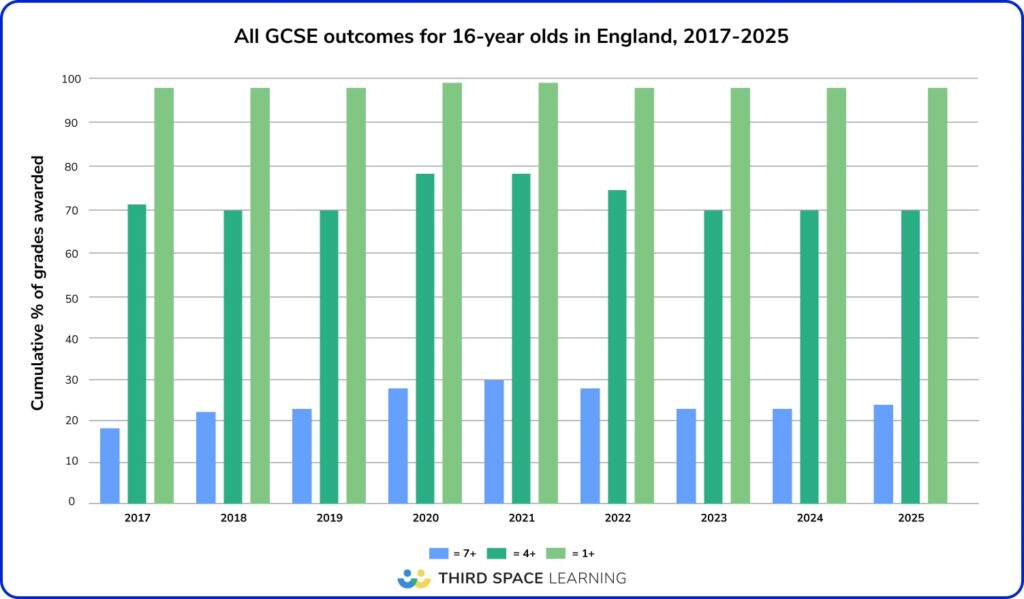
What are the key GCSE results day numbers?
The following headline information applies to all GCSEs in all subjects for 16-year olds in England.
GCSE students achieving a grade 1 or above:
- The proportion of grade 1+ awarded has remained the same as last year at 98.2%;
- Grade 1+ passes are still slightly lower than pre-pandemic averages.
GCSE students achieving grade 4 or above (commonly referred to as a ‘pass’):
- The proportion of grade 4+ awarded has risen very slightly by 0.1 percentage points to 70.5%;
- This is in line with last year’s result (70.4%), remaining higher than pre-pandemic averages.
GCSE students achieving top GCSEs (grade 7 or above):
- The proportion of grade 7+ awarded has increased by 0.4 percentage points to 23%;
- Since 2023, the proportion of grade 7+ awarded has risen by 0.6 percentage points; this is quite a bit higher than the 2019 result of 21.8%.
The GCSE resit crisis
While the 4+ pass rate for 16-year olds in England has risen slightly by 0.1 percentage points, headlines are reporting a fall in GCSE pass rates for all ages this year. This is because the all-age data takes into account all other entries, including post-16 resits. In this area, the picture is not so positive; in England, the 4+ pass rate has fallen slightly from 67.4% last year to 67.1% this year.
There was a similar drop in results last year, meaning that grade 4+ passes have fallen 0.8 percentage points since 2023. This, combined with the fact that nearly a quarter (23.4%) of all English and Maths entries this year were from resit candidates, has led Jill Duffy, the head of OCR, to call for reform to Maths and English secondary education and its “resit crisis”.
Regional differences in GCSE results
The picture is slightly different this year for Wales and Northern Ireland. Whereas the pass rate has dropped for all ages in England, Wales has seen a 0.3 percentage point increase in GCSE passes, with 62.5% of results grade C/4 or above. In Northern Ireland, the pass rate has also risen by 0.8 percentage points from 82.7% to 83.5%.
When looking at regions within England, the gap between the highest and lowest performing regions (London and the West Midlands respectively) has narrowed from 9.4 percentage points to 8.7 percentage points. This is the first time that the gap has shrunk since 2021; however, it remains wider than at any decade prior to the pandemic.
GCSE results 2025: maths
At Third Space Learning, we specialise in supporting schools with mathematics resources and tuition so that’s the primary focus of this article.
If you’re interested in finding out what other maths teachers and school leaders thought about the exams during June, take a look at our 2025 GCSE maths survey. Here we asked teachers for their reflections on the individual papers, how students perceived them, and also the type of preparation and maths revision that they found most useful for their students.
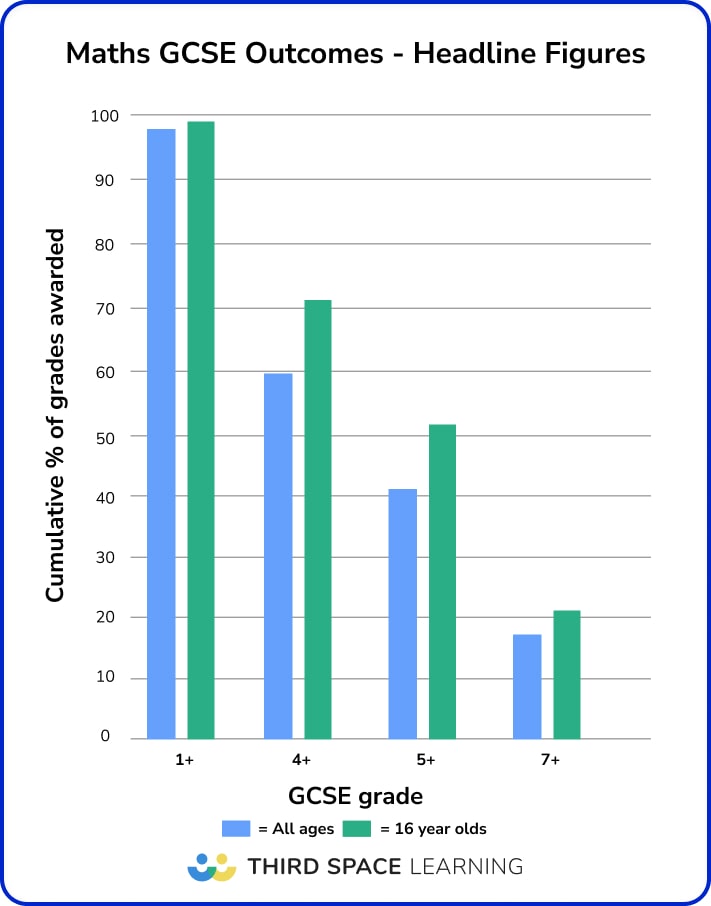

What are the key GCSE maths results data?
For 16-year olds in England in 2025, results are generally very close to 2024 figures:
- The proportion of grade 1+ awarded in GCSE maths has dropped again very slightly by 0.1 percentage points from 2024.
- The proportion of grade 4+ awarded in GCSE maths has dropped slightly by 0.1 percentage points; this remains higher than the 2019 figure of 71.5%.
- The proportion of grade 5+ rose last year by 0.9 percentage points, but has fallen in 2025 by 0.5 percentage points, and is now much closer to the 2023 figure of 52.4%.
- The proportion of top grades (7+) awarded in GCSE maths has risen by 0.3 percentage points, now standing 1.1 percentage points higher than the 2019 figure of 20.4%.
We only usually comment on anchor and pass grades in our headlines, but this year it is worth noting a fairly significant jump of grade 8+ awards, from 11.5% in 2024 to 12.6% in 2025. Grade 9 awards have remained consistent.
GCSE results 2025: core subjects
Here are the headlines and highlights from the other core subjects.
English Language GCSE results 2025
GCSE English language is a mandatory subject, with students required to achieve at least a grade 4 to meet entry requirements for sixth form or college. There is an opportunity to resit English at post-16 level.
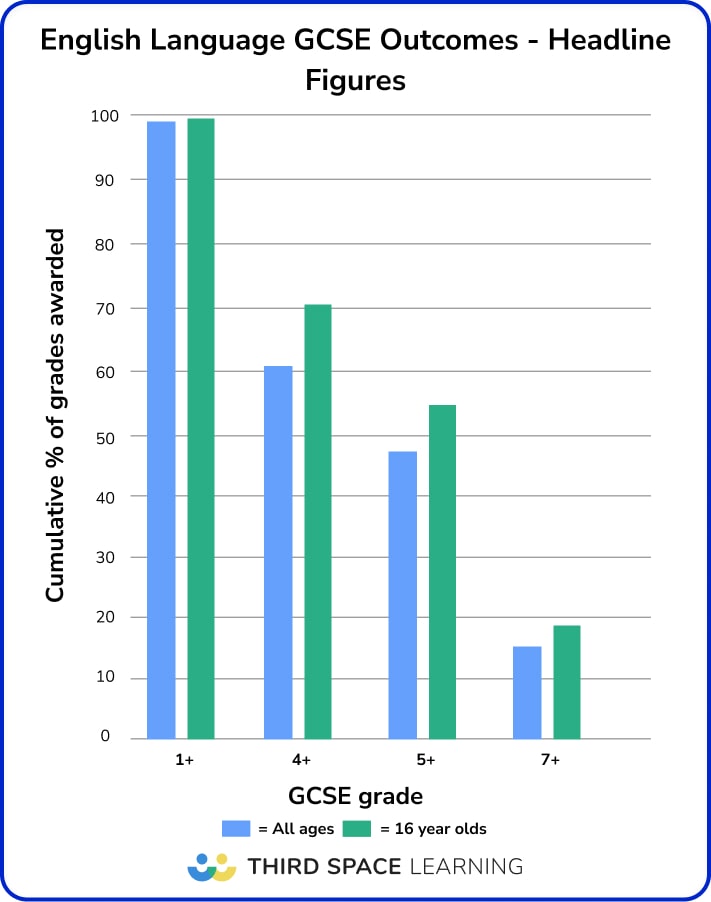

Patterns in GCSE English language results show similarities to this year’s Maths results, namely:
- The proportion of pass grades (both 4 and 5) awarded has dropped since 2024.
- The proportion of higher grades (7+) awarded has risen.
Although both subjects have experienced a similar pattern in results, the variations have been larger in English than in Maths. For example, the drop in the proportion of grade 4+ awarded is 0.5 percentage points greater in English than in Maths.

GCSE Science results 2025
Science is also a core subject, but students are not required to achieve a particular grade or to resit GCSE exams to reach a minimum standard.
Combined Science saw a drop in results in 2023, the year when most post-pandemic exam adaptations were removed. These results were up slightly in 2024 and have risen again in 2025, with an increase of 0.5 percentage points on the proportion of grade 4+ awarded.

Year on year comparison of GCSE maths results
Following a few years of disruption caused by the Covid-19 pandemic, all exam adaptations and grade boundary adjustment measures were removed by Ofqual by summer 2023, and, accordingly, GCSE results fell in comparison to previous years.
Last year (2024), grading proceeded as usual, and results were broadly similar to 2023. This has been the case again for 2025 – grades are generally lower than during the pandemic years, but remain slightly higher than 2019’s results.
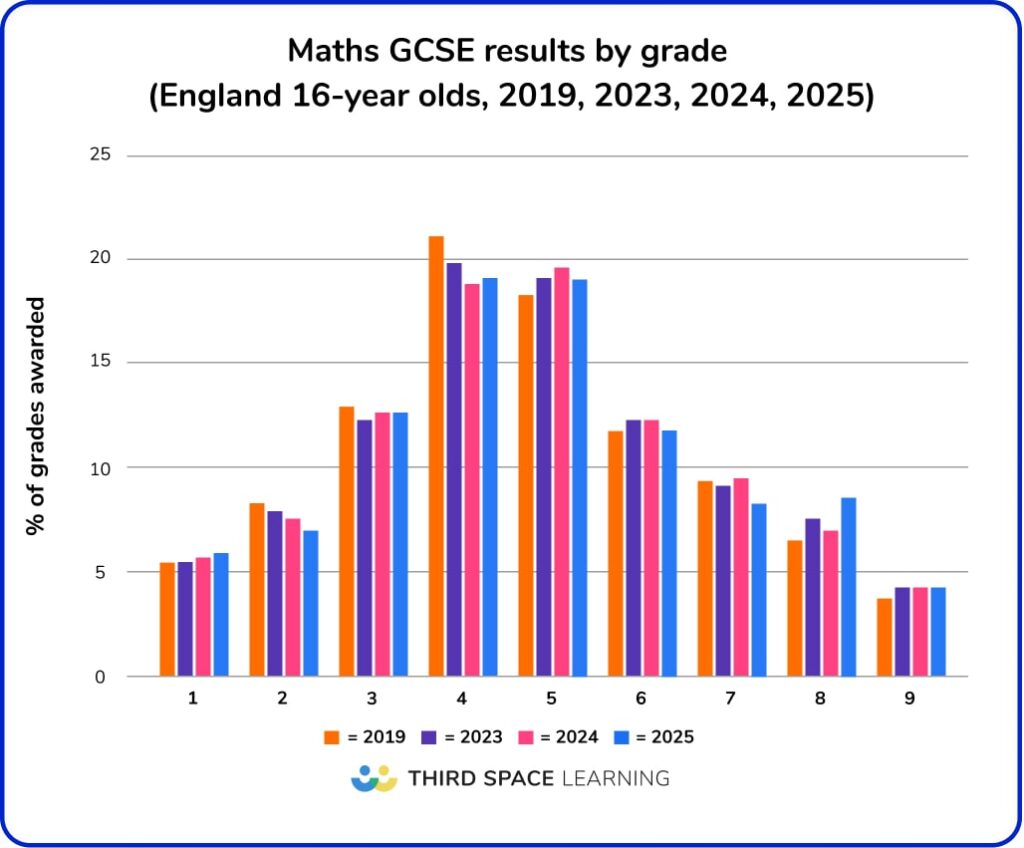
Since 2022, generally the proportion of higher grades awarded has decreased and the proportion of lower grades awarded has increased. Last year (2024), there were minor fluctuations around the “non-benchmark” grades – e.g. grade 2s were down slightly, and grade 3s were up.
We also saw some more significant fluctuation around the grade 4-5 boundary in 2024, with the number of grade 4s awarded down slightly and the number of 5s up.
This year in 2025, we have seen the reverse, indicating that this year’s borderline candidates may have struggled more to find the marks necessary to tip over into a grade 5.
While the proportion of grade 7s awarded is down on 2024, the proportion of grade 8s has risen significantly; this, combined with the slight raise of 0.3 percentage points in the number of higher grades (7+) awarded, seems to suggest that top candidates have done better and gained more marks on the most difficult topics.
Edexcel 2025 foundation grade boundaries for GCSE maths
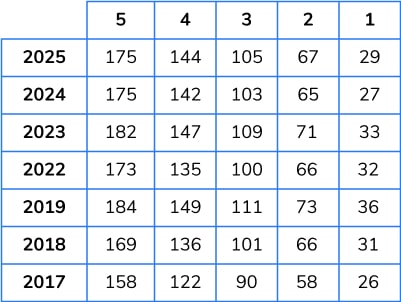
- This year’s boundaries for Foundation GCSE are very close to last year’s – there has historically been more variation year-on-year with Foundation boundaries.
- Generally, boundaries are also very close to historical averages, with the only stand-out being the grade 4 boundary (4 marks higher than average).
Edexcel 2025 foundation GCSE grade boundaries by maths paper
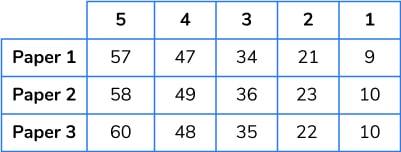
- Boundaries were very similar across all three papers, with very little variation across grades.
- Paper 1 had the lowest boundaries, which is fairly typical for GCSE papers, as candidates tend to perform worst on the non-calculator paper.
Edexcel 2025 higher grade boundaries for GCSE maths
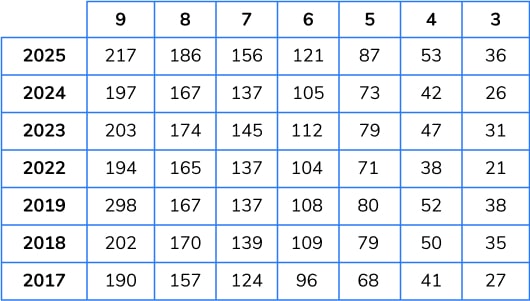
- Boundaries for 2025 are significantly higher than any previous Edexcel Higher GCSE maths paper since GCSE reform in 2017.
- The biggest variation occurs in the top grades (7, 8 and 9), with boundaries a massive 16-17 marks higher than the average of all series.
- This seems to indicate that students, particularly stronger mathematicians aiming for a grade 7 or higher, found this year’s Edexcel Higher paper easier than usual.
Edexcel 2025 higher GCSE grade boundaries by maths paper

- Boundaries were generally similar across the three Higher papers.
- Paper 1, as usual, had the lowest boundaries, reflecting the fact that it’s the only paper where a calculator is not allowed.
- Paper 2 had slightly higher boundaries overall.
How to use the GCSE results 2025 data
Once you’ve wrapped up this year’s exam season – congratulating successes, offering support where needed, and applying for remarks as necessary – September is an ideal time to reflect on key lessons that can be applied to the next round of GCSE exams.
Key focus areas
- Look at both high and low-performing students. Were there any surprises?
- Investigate the reasons behind any underperformance. Were these students identified and supported earlier in the year?
- Evaluate the effectiveness of any GCSE interventions your school or department provided.
- Use question-level analysis to identify class-wide patterns.
- If borderline scripts are sent off for review of marking, take the time to analyse them when they are returned, even if the marks remain unchanged.
- Some GCSE exam boards allow you to view scripts electronically (with student permission), which is worth exploring.
- Use the analysis tools provided by your exam board. For example, compare your results to the board average to identify your students’ relative strengths and weaknesses.
Looking at class-wide trends, consider the following:
- Are there any GCSE maths topics that your entire class or school struggled with?
- Were these topics anticipated? For example, students aiming for a grade 4 struggled with the large amount of graph work on this year’s papers.
- If unexpected topics showed poor performance (e.g. all students consistently struggled with procedural standard form questions), this might highlight areas for improvement in teaching and learning next year.
- Identify the types of maths questions students are finding difficult. Can this be addressed in the upcoming year?
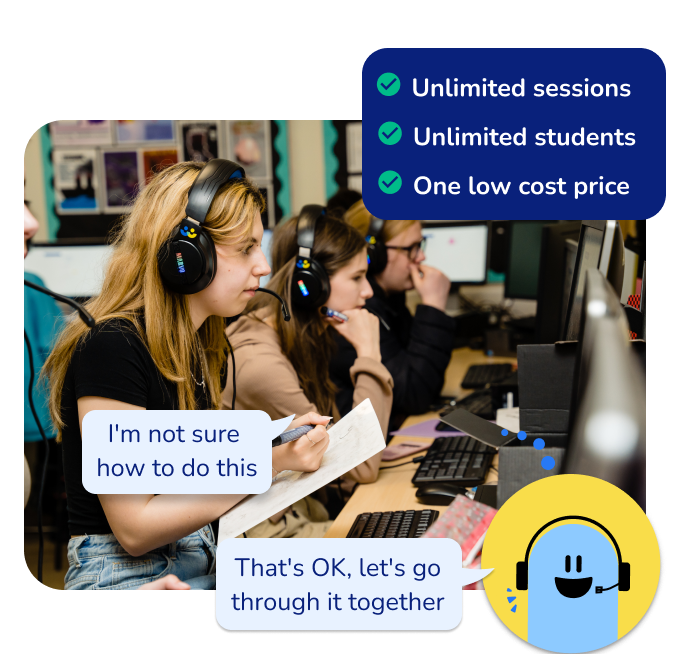
Unlimited GCSE maths tutoring with Skye, the voice-based AI maths tutor.
Built on the same principles, pedagogy and curriculum as our traditional tutoring but with more flexibility, reach and lower cost.
Help your GCSE students achieve their target grade with Skye’s one to one maths tutoring.
Watch Skye in actionSupporting students on results day and beyond
Results day can be a stressful and emotional experience, even for those who achieve great results. It is important that pastoral support is offered for all students, both on results day and during the wider results period. Most students experience significant disappointment if their exam performance was not as expected, particularly when they have put in a lot of hard work during preparation and revision.
Students who do not meet their expected grades may require practical support to enable them to make informed decisions about their future. This may include:
- Explaining the exam appeals process to young people and their parents;;
- Applying for remarks if a student has narrowly missed a required grade;
- Helping to select different courses for post-16 study;
- Helping to find new course options;
- Liaising with local sixth-forms and colleges if required;
- Starting the preparation for sitting GCSE resits
GCSE MATHS 2026: STAY UP TO DATE
Join our email list to stay up to date with the latest news, revision lists and resources for GCSE maths 2026. We’re analysing each paper during the course of the 2026 GCSEs in order to identify the key topic areas to focus on for your revision.
GCSE dates 2026
GCSE results (2026 when available)
Get ahead on revision with the GCSE maths papers analysis from 2025:
Analysis of GCSE Maths Paper 1 2025
Analysis of GCSE Maths Paper 2 2025
GCSE Maths Paper Analysis and Summary 2025
GCSE Maths Teacher Survey Results 2025
GCSE results day FAQs
GCSE results in 2025 were released on Thursday 21 August. Results were available to students from 08:00 from their school or college.
The GCSE grading system in England remains unchanged from 2015. Students are awarded grades on a 9-1 scale. Grade 4 is roughly equivalent to the old grade C, and is the “standard pass” mark. In Wales and Northern Ireland, grades A-G are used. Northern Ireland introduced a C grade in 2019.
Yes, GCSEs will be taking place as usual in May and June 2026. The complete timetable will be published by the exam boards later this year. The dates for the GCSE maths exams in 2026 are expected to be:
Thursday, 14 May 2026: First paper for Edexcel, OCR & AQA – Non-Calculator
Wednesday, 3 June 2026: Second paper for Edexcel, OCR & AQA – Calculator
Wednesday, 10 June 2026: Third paper Edexcel, OCR & AQA – Calculator
GCSE students who did not achieve their desired results have the opportunity to retake their GCSE exams. The first round of GCSE resits for this cohort will be held in November 2025.
The key dates for the 2025 GCSE maths resits for the three main exam boards in England (Edexcel, AQA, OCR) are:
Wednesday 5 November 2025
Friday 7 November 2025
Monday 10 November 2025
The entry requirements for sixth forms or colleges will depend on the course(s) selected. There is a minimum GCSE requirement of a 4/C in English and maths for all students accessing post-16 study, with resits available for students who do not meet this standard.
Each course may have further requirements, such as specific grades in particular subjects. Vocational courses, such as BTEC qualifications or T-Levels, may have lower grade requirements than A Levels.
A levels are a popular post-16 option, with students able to choose from a wider range of subjects than is usually offered at GCSE. Many A levels require specific qualifications, with some courses having higher entry requirements.
Vocational qualifications, such as BTECs and T levels, offer a more practical approach to learning, with students able to gain work experience and skills.
DO YOU HAVE STUDENTS WHO NEED MORE SUPPORT IN MATHS?
Skye – our AI maths tutor built by teachers – gives students personalised one-to-one lessons that address learning gaps and build confidence.
Since 2013 we’ve taught over 2 million hours of maths lessons to more than 170,000 students to help them become fluent, able mathematicians.
Explore our AI maths tutoring or find out how a GCSE maths tutor could support students in your school.

